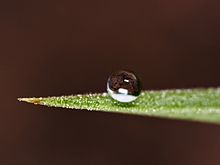the physical or chemical property of a molecule or substance that repels water.
In chemistry, hydrophobicity is the physical property of a molecule (known as a hydrophobe) that is seemingly repelled from a mass of water. (Strictly speaking, there is no repulsive force involved; it is an absence of attraction.) In contrast, hydrophiles are attracted to water.
Hydrophobic molecules tend to be nonpolar and, thus, prefer other neutral molecules and nonpolar solvents. Because water molecules are polar, hydrophobes do not dissolve well among them. Hydrophobic molecules in water often cluster together, forming micelles. Water on hydrophobic surfaces will exhibit a high contact angle.
Examples of hydrophobic molecules include the alkanes, oils, fats, and greasy substances in general. Hydrophobic materials are used for oil removal from water, the management of oil spills, and chemical separation processes to remove non-polar substances from polar compounds.
Hydrophobic is often used interchangeably with lipophilic, "fat-loving". However, the two terms are not synonymous. While hydrophobic substances are usually lipophilic, there are exceptions, such as the silicones and fluorocarbons.
The term hydrophobe comes from the Ancient Greek ὑδρόφόβος (hýdrophóbos), "having a horror of water", constructed from Ancient Greek ὕδωρ (húdōr), meaning 'water', and Ancient Greek φόβος (phóbos), meaning 'fear'.




